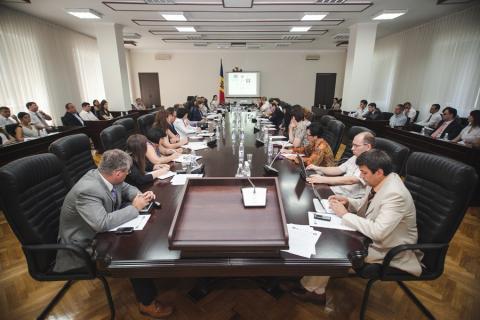Moldova making steps towards a more inclusive and participatory process around Open Government
The Government of Moldova took a different and more participatory approach on developing and consulting the new open government action planAction plans are at the core of a government’s participation in OGP. They are the product of a co-creation process in which government and civil society jointly develop commitments to open governmen... for 2014-2015. The launch of the new process, which is significantly different from last year and which actively involves representatives of civil society, took place on July 9th. This event, organized by the Government of the Republic of Moldova in close collaboration with the civil society working group on E-Government/Open Government (National Participation Council) gathered over 70 representatives of central public authorities, the e-Government Center, State Chancellery, international development partners, private sectorGovernments are working to open private sector practices as well — including through beneficial ownership transparency, open contracting, and regulating environmental standards. Technical specificat... More and civil society. The political context, in which a new Prime Minister has recently taken office, lessons learned during 1 year of the action plan implementation as well as openness towards civil society’s feedback contributed to a re-designed approach to the open government initiative.
An important element for starting the development of the new action plan was the results achieved in the existing action plan. The recent event gathered government and civil society representatives to open table. The Government presented the progress report of implementing the action plan in 2012 and the civil society presented the monitoring report of the implementation of the action plan and another report on the progress on opening government data. Out of the 40 actions to be delivered in 2012, the Government implemented 12, did not start the implementation of another 12 with remaining 16 in progress. The Association for Participatory Democracy, funded by Soros Foundation Moldova on this project, presented its findings on main challenges that slow down the implementation of commitments, which were discussed in a friendly manner.
Last year’s approach in the development of the action plan, which was drafted by the government and presented to the public for consultations, is different from the new approach in which the government invites civil society to draft the action plan together. The new action plan will focus on several key sectors such as educationAccountability within the public education system is key to improving outcomes and attainment, and accountability is nearly impossible without transparent policies and opportunities for participation ... and youthRecognizing that investing in youth means investing in a better future, OGP participating governments are creating meaningful opportunities for youth to participate in government processes. Technical ... More and cross sectorial initiatives such as participatory decision-making and open government data. For greater collaboration ministries will hold meetings with civil society in which specific actions will be drafted towards the national action plan.
Having Veronica Cretu, the most active civil society representative who facilitates the dialogue between the government and civil society on the implementation of the open government agenda as member of OGP Civil Society Steering CommitteeThe Steering Committee is OGP’s executive decision-making body. Its role is to develop, promote and safeguard OGP’s values, principles and interests; establish OGP’s core ideas, policies, and ru... is a valuable asset. A greater involvement of civil society in this initiative has the power of keeping the government accountable and responsive, especially when a greater participatory decision making is a priority.
The first year of the open government action plan implementation process was a valuable experience. The government is learning the lessons and aims towards a more participatory consultation process of the new action plan, for greater awareness of the initiative at the national level and for an improved quality of action plan implementation indicators. The re-designed approach to the open government initiative is based on lessons learned and a greater involvement of the civil society. All the efforts are now focused on the development and adoption of the new action plan by the end of 2013 and on Prime Minister’s presentation of the most robust commitmentOGP commitments are promises for reform co-created by governments and civil society and submitted as part of an action plan. Commitments typically include a description of the problem, concrete action... of the action plan in October in London.

